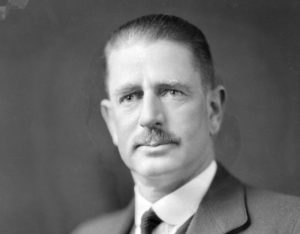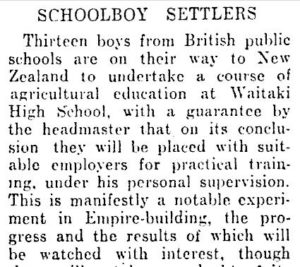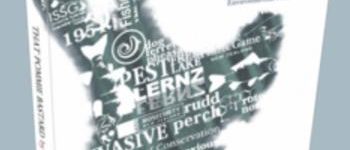1929: That Pommy Bastard
January 28, 2020
By AHNZ
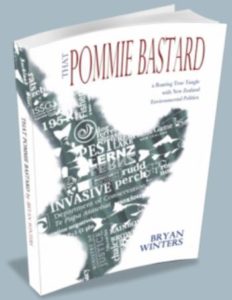
Joseph Stewart Smith was a British boy of 15 in 1928 when he was plucked out of his native environment and forcibly acclimatised to the strange wilds of New Zealand.
Without any doubt, this was traumatic to young Stewart but he repressed it. The final cut with home was being rejected at Southampton Dock by his father, posted like sea freight with his brother to be a Boy Farmer on the other side of the world. All his long life Smith would look back upon his happy life growing up in London’s East End, “…a happy playground where he had mastered the art of catching tiddlers in the sandhill ponds by the age of 5, and this play developed into a lifelong passion” for recreational fishing¹.
What we repress, we act out unconsciously. For some 50 years, Smith devoted himself to plucking British fish out of their natural environment and forcibly acclimatising them to the strange wilds of New Zealand. By this act, Stewart had projected his own unfelt feelings of violation and anger into New Zealanders and re-written the fresh water environment in the process.
Schoolboy Settlers
How young Joseph came to be here was the doing of another Joseph, the Prime Minister. Joseph Coates’ Government worried about population decline and employed their usual modus operandi of trying to stimulate it with State interference. Coates followed up on his 1925 election promise by creating a family allowance for children; Have more babies, pay less tax! This impulsive gesture to meet the fear of falling birth rates² flew in the face of what the free market was right to ‘desire’ (less breeding) as the challenge of the Great Depression was coming up on the horizon. Coates would go further later, creating a ‘Bachelor Tax’ by providing a special tax threshold for the unmarried man. The message was clear: Take a wife, have more babies, grow this nation’s population!
This same logic applied to the idea of growing the New Zealand population by importing young men from Britain. Waitaki High School (image left) and Flock House both had acclimatisation programs for juvenile Britains. The 15yo Joseph Stewart Smith (and his little brother) were probably selected for one of the above institutions³.
“Unable to afford to keep his sons, he sent them to New Zealand, a land desperately looking for cheap farm labour.”
“Farming did not work out for Smith.”
“He quit after having to destroy his dog with a fence batten. The poor beast had bitten Smith after being caught in a trap and he could see no alternative.”- ODT
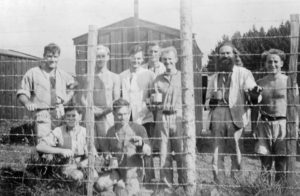 The acclimatisation did not work on this one, it was a horror. At this point, Smith fell in with the Communists. As the likes of future Prime Minister Peter Fraser or Archie Baxter had famously done during the First World War, Smith became a Contentious Objector to the Second World War. He was locked up for four years in a Conchi Camp.
The acclimatisation did not work on this one, it was a horror. At this point, Smith fell in with the Communists. As the likes of future Prime Minister Peter Fraser or Archie Baxter had famously done during the First World War, Smith became a Contentious Objector to the Second World War. He was locked up for four years in a Conchi Camp.
“He was living in a conscientious objectors prison camp by the Tongariro river that was running out of food. He constructed nets and smoking rooms to feed the camp with fish.”- Story Tellers Guide
My observation of Western Communists is that they are reactionary toward parents who put their own wealth and career ahead of family. Transposing the hurt relationship into politics, the Communist gets attention from their surrogate parent- The State- by rebelling and, in this case, being sent to their bedroom/detention camp. In terms of this psychodrama, I think these 4 years must have been Smith’s happiest since being shipped to New Zealand. However, his next drama would be tailor made to his own circumstances and see him through to his death (aged 95) in 2008.
Massey Service Station
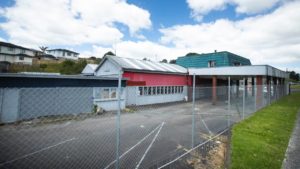 Until just a few years ago (c.2015?) I used to always buy my petrol from Caltex on Triangle Road, Massey. The yard and building first appear on aerial maps in 1959 and are much unchanged in 2020.
Until just a few years ago (c.2015?) I used to always buy my petrol from Caltex on Triangle Road, Massey. The yard and building first appear on aerial maps in 1959 and are much unchanged in 2020.
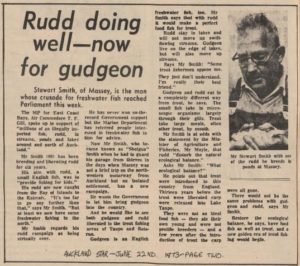 When Smith owned this garage back then Massey was an isolated locality for orchards not the sprawling burb with the motorway passing through that it became in the late 1970s. It wasn’t even called Triangle Road yet (what, then?) when Smith’s garage became a good earner for him. The remoteness did, however, require him to protect his new wealth which is what earned him the name Shotgun Smith⁴.
When Smith owned this garage back then Massey was an isolated locality for orchards not the sprawling burb with the motorway passing through that it became in the late 1970s. It wasn’t even called Triangle Road yet (what, then?) when Smith’s garage became a good earner for him. The remoteness did, however, require him to protect his new wealth which is what earned him the name Shotgun Smith⁴.
“An aging communist armed with oxygenated fish tanks in his car roamed New Zealand’s countryside for decades in a bizarre crime spree that forever changed our environment. It led him to be called one of the country’s worst environmental criminals; but to some, his legacy is much more complicated.”
[…]
“He’d left quite a lot of money, and part of his last will and testament was he wanted a book published telling his story,” Winters says.
“Stewart Smith had even suggested a title: That Pommie Bastard.”
[…]
“Acclimatisation field officer Frank Thompson had an even stronger opinion of Smith published in the Auckland Star in 1980, “If this man had done the same thing with poisonous snakes, he would have been shot.””- ODT ibid
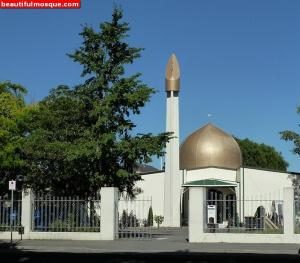 The old buildings beside where the Caltex used to be always seemed mysterious to me. This is where Smith housed the aquariums he employed to raise up exotic fish in order to spread them around New Zealand’s rivers and lakes. Behind the building there is a stream for fresh water but for years now it has been clogged up with tall weeds over a steep bank. There wasn’t much to see when I investigated this a few years ago but at least there were some blackberries to eat.
The old buildings beside where the Caltex used to be always seemed mysterious to me. This is where Smith housed the aquariums he employed to raise up exotic fish in order to spread them around New Zealand’s rivers and lakes. Behind the building there is a stream for fresh water but for years now it has been clogged up with tall weeds over a steep bank. There wasn’t much to see when I investigated this a few years ago but at least there were some blackberries to eat.
The building came to my attention again back in March 2019 because suddenly became decorated in all sorts of flowers. Also, policemen sat baking in their open-doored squad cars on 24/7 patrol for days back then. All Muslim Mosques or gathering places received similar treatment after the Christchurch Massacre. Only because of this did I realise that the old warehouse had become an Islamic centre now. Within the last month or so, the old Caltex site has become built on again in what I assume is a much nicer Mosque than Smith’s old fish tank base of operations.
“Around 2005/6 MAF and DOC went on a catfish jihad and part of the collateral damage was an old Red-tailed Catfish named Garfield.”- 2005: State Jihad on Catfishing
The independent transformation of New Zealand’s fisheries is absolutely frowned upon today. From about 2005 The State renewed its jihad on species they considered too exotic. Smith’s dream was of his time, conducted over years where The State was too ambivalent or inept to administrate over authority they reserve to themselves. Perhaps if The State would get out of the way and let free people decide what gets to live in their waterways then someone like Smith wouldn’t be able to slip through the net?
—
1 Muddying the waters by introducing coarser fish; ODT
2 Ref. We Won, You Lost, Eat That!; Goldsmith (2008)
3 Ref. Schoolboy Settlers; NZ Herald; Papers Past
and
Ref. Flock House; Thames Star; Papers Past
4 Rudd doing well; Sunday Star Times; p6, Craccum (1973)
Image ref. Book cover; Story Tellers Guide
Image ref. Conscientious Objector, Hautu Detention Camp, at the same time that Smith was locked up at Tongariro River; A.C. Barrington Collection; Alexander Turnbull Library
Image ref. Joseph Gordon Coates; Alexander Turnbull Library
Image ref. Smith’s old yards down Triangle Road; CHRIS MCKEEN/STUFF
Image ref. Al Noor Mosque; Beautiful Mosques Pictures
Ref. The Liberator: How one man’s 15,000 pest fish changed New Zealand’s waterways; Stuff
Ref also. Eel of Fortune, Auckland’s expensive effort to undo Smith’s work in one of its reservoirs; NZB3
 Like Comment Share
Like Comment Share

